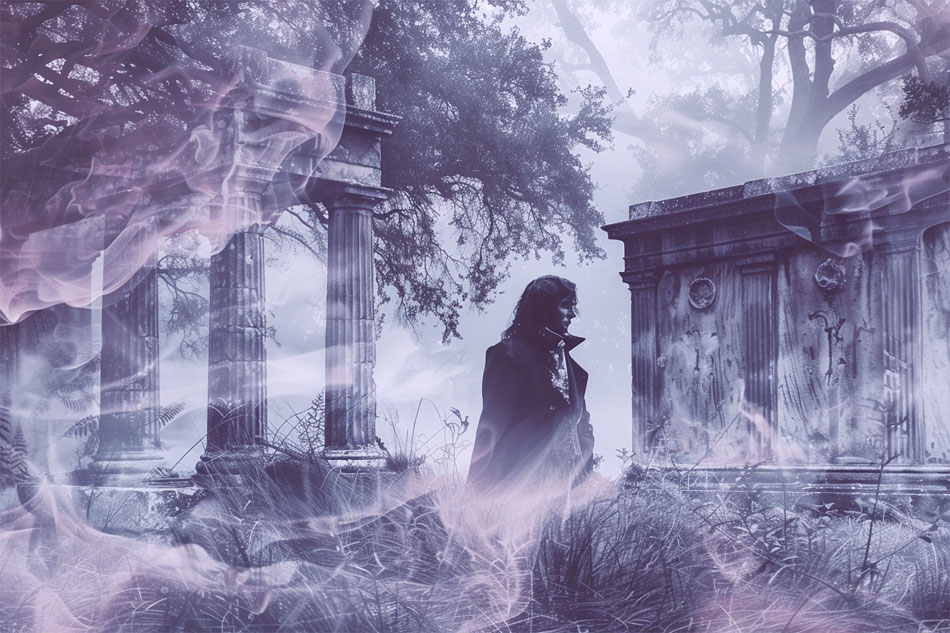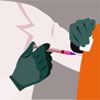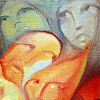Most Ghosts Don’t Know That They’re Dead
 by Lance G. Trendall
by Lance G. Trendall
One of the funniest, yet most tragic, things I’ve learnt about ghosts is that they don’t believe they are ghosts. So in an ironic sense, they don’t believe in ghosts either.
How can that be? How can someone be a ghost and not know that they are dead?
Sounds ridiculous, but it’s true. Many books support this theory and the ghosts I’ve chatted with bear out this truth too.
So how could we die and not know about it? When we fall asleep nothing actually happens that we are aware of. We’re tired, relaxed, then the next thing we know, we’ve been to sleep and are now awake. Even if you keep dozing off on those rare occasions when you have a nap, you are only aware of having woken up. How often have you said, or heard it said, “I must have dropped off”? Or even when people think that they have not been to sleep at all, “I was just resting my eyes” yet everyone in the room heard the snoring!
Why should the deeper sleep of death be any different? If you talk to people about relatives dying they often say he seemed so peaceful and he went so quietly. Yes people do also just nod off to death. This is quite reasonable really, if you think about it.
A book that I shall refer to is called ‘The Return of Arthur Conan Doyle’ and includes some of the teaching passed on by the late Arthur Conan Doyle through a medium during a two year period. In this book he says “Everyone does not at once realize that he has passed out of his physical body.” He expands on that and later says “Not that there will be anything novel about our astral environment, since we go there every night when we fall asleep. Sleep being a little death, we are well practiced in dying, and in this fashion die three hundred and sixty-five times yearly. With each day we awake with the same certainty, we shall presently awake after our death, since both sleeping and dying are natural functions of our being.”
Sudden death is a more shocking concept to take in I agree, you may wonder how we could miss the experience of dying in an accident. But consider a case where after an accident where the victim loses consciousness and wakes up in a hospital saying “Where am I? What happened?”. Death could also happen during the same state of unconsciousness and you can see how we could be unaware of it.
Think about it though and keep an open mind while I share an example from a book by Carl Wickland, a psychiatrist. He wrote about his mental patients, and his wife’s experiences as a medium, over a thirty year period; his book ‘Thirty Years Among The Dead’.
There was the ghost of a blacksmith chatting through the medium, Mrs Wickland, back in the 1920’s who seemed surprised to hear that he was dead. He went on to remark that “I was just shoeing this horse and got a bump on my head, it must’ve been harder than I thought”.
How often have you hurt yourself so severely that you’ve gone into a state of shock and become almost oblivious to your surroundings and even unaware of the pain you felt? If you consider that the state of shock is completely available after death due to a sudden accident then it’s easier to imagine how people die and simply miss the experience. Next thing they know they’re up and about, rubbing their sore head but apart from that they’re okay except that their body is still in the morgue, the ambulance or the hospital bed. So, please accept for a moment that this is all possible, however incredible or far fetched it may seem.
I am not saying that this is true of all death, please appreciate that I am talking about what may happen and often has happened to someone who becomes a ghost. Most people do not become ghosts, most of the time, as far as I know.
To help us consider what it is like for these dead people who think they are still alive, let’s look at the example of a man who got run down by a car when he was crossing the road.
Suddenly hit by a car and killed instantly the man gets up (and out of his body) rubs his head and thinks “that was close, gosh my head hurts”. Off he goes walking along as he was, on his way home. When he gets in, his family seem a bit strange. They are all upset and crying. His meal isn’t even ready and what’s more, none of them talk to him. He wonders what he’s done wrong and eventually when he can think of nothing to deserve this, he asks his wife.
“What have I done wrong?”
She ignores him. He wishes she’d stop crying and tell him what’s going on. Instead she prepares dinner but cooks him nothing, doesn’t even set a place at the table for him, no coffee, nothing.
So our friend is pretty upset himself, he loves his family and hates to see them so miserable, destitute even. He goes to bed and sleeps with his wife who sobs most of the night and refuses to talk.
In the morning he awakes with renewed optimism, “maybe they’ll have got over it” he thinks. No such luck, he comes down for breakfast and the same story. Loads of sad red eyes and still even his kids won’t speak to him.
“Stuff you” he says “I’m going to work”.
At work, they know he’s dead too; when he gets there he is horrified to find someone else in his office using his desk and doing his job.
“What’s going on? This is my office” but no answer. More people ignore him. He goes to his boss who ignores him, even though they were good friends, which adds to the anger and confusion. But of course the boss cannot see or hear the ghost of his employee. Now he’s going demented with worry and confusion, his whole world is shattered. His family, his colleagues, even his friends don’t acknowledge him.
The confusion grows and he becomes more worried with every incident. The harder this man looks for the answer the further from it he gets. He only looks amongst the material world he knew. So he’s a ghost: A spirit attached to the dimension of being in a material form.
What now? What can this ghost do? He wants to be acknowledged, we all do. We all want friends and communication, love, respect, all those things this ghost wants too. He feels entitled to all those enjoyable feelings he had before. He thinks he’s alive but is beginning to think he must have done something awful to be treated like this.
He starts to wander around the place, trying to speak to anyone who’ll listen, but no one does. If he learns to, maybe he’ll smash things to attract attention and still be ignored. This is one unhappy state to experience. There is even a recorded example of a ghost describing how he “got on the bus and this fat lady sat on top of me. I bashed and bashed her, shouted at her but she wouldn’t get off me. The bus came to my stop and still she sat there ignoring me. I passed my stop. Eventually she got up and got off the bus.”
The ghost still thinks that he has a body and experiences a feeling of being pinned down when sat on. He does not realize that he could simply move away by thinking he’s somewhere else. He thinks that he still has a body and can only get up when the large weight is removed.
Ghosts that open doors in a haunted house, for example, are exhibiting the same phenomena; they think they have a body and can therefore only enter a room by opening the door or by waiting for someone else (mortal) to open it.
One ghost, Frank, who spoke through the medium, Mrs Wickland, said “I don’t know what is the matter with me anyhow. I have asked everybody I saw, but everybody passed by; they were so stuck up they wouldn’t talk to a fellow any more”.
Frank’s comment shows the way in which a confused ghost will blame other people for his condition of being ignored. He’ll hardly find the solution by blaming us, living mortals, for ignoring him will he? He’s the one who has nobody, how can it be our fault? He spends his time thinking we are ignoring him, if only he could realize that we cannot see him.
The state of confusion is vast. It’s greater than anything I can think of in our lives and impossible to understand should you get like Frank. Frank had been so confused that he had been influencing a mental patient, Mrs Burton, and exorcism from her, along with other spirits, was part of the cure of her mental difficulty.
Eventually, after what can be hundreds of years or just months, something seems to happen to awaken these lost souls. Some wander around and find a receptive person and take over their body, yes possess them; it’s more common than you may think but not as extreme as in films like ‘The Exorcist’. Or, maybe the ghost will accept that his only way to communicate is to smash vases around people’s homes. He forgets the joy of having family and friends; he accepts his tragic situation as the only reality he is now entitled to.
To attract people’s attention he makes a noise or moves things. This is called a ‘poltergeist’ or noisy ghost. Unfortunately this merely proves that he exists and that we do seem to ignore him unless he is a nuisance. It could make things worse for the poltergeist, as he now believes even more firmly that he’s alive and therefore is less able to realize that he’s died.
So he becomes a Poltergeist. He smashes things for attention. All he really wants is to be acknowledged and loved, just like you and me. We don’t like being ignored or excluded, especially by those we love. Why should a ghost need anything different?
I’ve heard many theories about poltergeists, one of which is that they are common in the homes of adolescent girls. I propose that the upset and ignored ghost can find empathy with the rebellious nature of some adolescents and enjoys being around them. You would surely want to change the world yourself if you were a ghost, ignored and unloved for some years.
You can see, if you are willing to experiment by accepting this philosophy as true, that it is pretty hard to imagine the dead person ever getting out of his confused state on his own. So, what can be done to solve his problem? What I call a rescue, to rescue him from his tragic reality and expand him to a more enjoyable and appropriate reality.
Through mediums, I have spoken to ghosts like the example and sensed both their state of sadness and then their elation at finding a new life with joy, love and communication with their family, albeit with those family members who are already dead. The witnessing of the transformation of a ghost, believing he’s alive, to the discovery of his immortality and of the presence of the spirit world, is so moving that I am determined to help prevent us mortals entering that state of confusion and often loneliness.
To conclude, most ghosts are people who don’t think that they’re dead and as they often don’t believe in ghosts, they would not consider their death as a possible explanation for their peculiar state of existence. They just think like the example Frank, from Wickland’s book that people are “too stuck up to talk to a fellow any more” or that they must be being punished for something they’ve done.
The answer to their problem becomes harder for them to find as each moment goes by. Just as we tend to rationalize our experience so that we see ourselves as mostly in the right, so a ghost will rationalize his own experience and blame us all for ignoring him, rather than seeking an explanation beyond his existing beliefs.
We’ll look at the solution to their ghost state in a later section on rescue work, a rescue being a term for the way ghosts are enlightened as to their state or rescued from their confusion.
Excerpt from Dead Happy
Part II coming soon.
Posted in Life After Death, Life On The Other Side, Other Topicswith no comments yet.






Leave a Reply